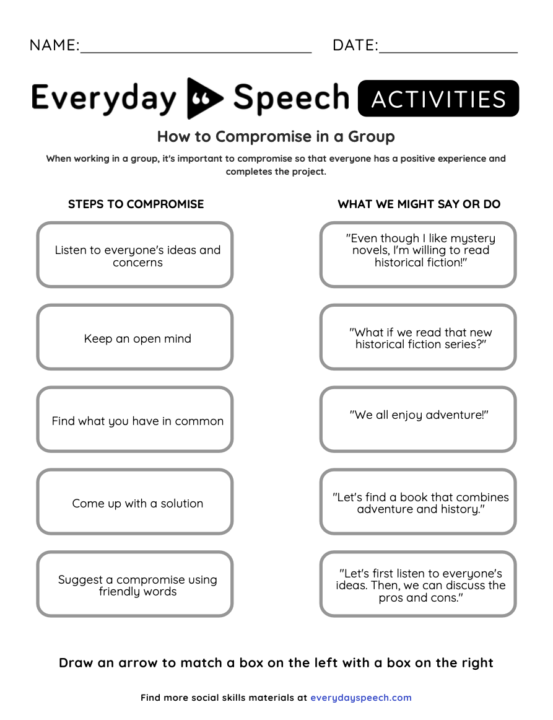
Middle school educators face the daily challenge of guiding students through the maze of social interactions, group projects, and collaborative learning. Special educators, in particular, are tasked with the delicate balance of addressing diverse learning needs while fostering a classroom environment where every student can thrive. One of the key skills that can make this balancing act a success is the art of compromise. This blog post introduces a Middle School Group Compromise Activity designed to teach students how to navigate group situations through compromise, aligning closely with the specific steps that facilitate this critical skill.
A Step-by-Step Guide to Teaching Compromise
Step 1: Explain the Importance of Compromise
Begin your lesson with a discussion on the significance of compromise within group activities. Highlight how compromise allows for diverse ideas and solutions to flourish, ensuring everyone feels heard and valued. This step sets the foundation, emphasizing that compromise is not about winning or losing but about finding a middle ground that benefits the group.
Step 2: Distribute or Display the Interactive Matching Worksheet
Introduce the “Middle School Group Compromise Activity” worksheet to the class. This interactive tool is designed to help students understand and apply the steps to effective compromise in group situations. Ensure each student has access to the worksheet, either through individual copies or a shared display if working collaboratively.
Step 3: Have Students Match the Steps with What to Say or Do
The core of this activity revolves around students matching specific steps of compromise with corresponding actions or phrases. These steps might include “Listen to Everyone’s Ideas and Concerns,” “Keep an Open Mind,” “Find What You Have in Common,” “Come Up with a Solution,” and “Suggest a Compromise Using Friendly Words.” Each step should be paired with practical phrases or actions that students can use in real-life situations.

Step 4: Review Answers and Have Students Explain Their Reasoning
Once the matching activity is complete, review the answers as a class. Encourage students to share their matches and explain the reasoning behind their choices. This review process is not just about confirming the correct answers but also about understanding the thought process of each student. It provides an opportunity for reflective learning and for students to hear different perspectives on approaching compromise.
Step 5: Role-Play Scenarios and Reflect on the Learning Experience
To wrap up the lesson, engage students in role-play scenarios where they can practice the steps of compromise. This hands-on approach helps solidify the concepts learned and provides a safe space for students to experiment with compromise strategies.
Following the role-play, facilitate a reflective discussion. Ask students to share what they learned from the activity, any challenges they faced, and how they might apply these skills in future group situations. This reflection not only reinforces the lesson but also encourages students to internalize the value of compromise.
Unlock your material for this lesson by signing up for your free trial today – no credit card required!
Sign up & get your worksheet now!
Instant access to thousands of no-prep social skills activities, over 800+ video lessons, and engaging games designed to enhance learning and development.
Conclusion
Teaching middle school students the art of compromise is no small task, but it’s one that yields profound benefits. By incorporating activities like the “Middle School Group Compromise Activity,” educators can provide their students with the skills to navigate group dynamics. This not only enriches their learning experience but also prepares them for a lifetime of collaborative success.
Sample Video
Students learn best from watching real students their own age model skills. Try out this sample video lesson. We offer our entire Social-Emotional Learning platform free for 14 days here!
Related Blog Posts:
Teaching Problem-Solving Skills through Social-Emotional Learning
Navigating Middle School: Enhancing Social Skills Through Videos
Enhancing Social Skills: Middle Schoolers Learn with Engaging Videos





